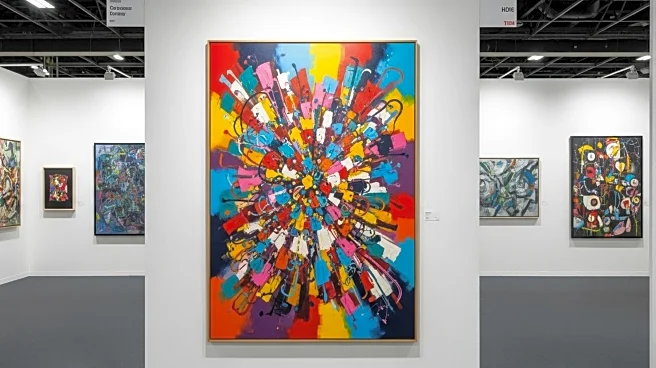What's Happening?
Samia Halaby, a US-based Palestinian artist, is exhibiting at Frieze Masters in London after her retrospective at the Eskenazi Museum of Art was cancelled last year. The cancellation was reportedly due to concerns over her social media posts supporting Palestinian causes amidst the Israel-Gaza conflict. Despite this setback, Halaby continues to promote optimism and activism through her art, engaging with young people and advocating for Palestinian rights. Her work has gained significant attention, with inquiries from collectors and institutions, and she remains committed to her activism, including creating fundraising posters and participating in workshops.
Why It's Important?
The cancellation of Halaby's exhibition highlights the ongoing tensions surrounding political expression and art, particularly in relation to the Israel-Gaza conflict. It underscores the challenges faced by artists who engage in political activism, as their work can be subject to scrutiny and censorship. Halaby's continued presence in the art world, despite these challenges, reflects the resilience of artists in advocating for human rights and political causes. Her story also emphasizes the importance of supporting diverse voices in the arts, as they contribute to broader cultural and political dialogues.
What's Next?
Halaby's participation in Frieze Masters may lead to increased visibility and support for her work, potentially opening doors for future exhibitions and collaborations. The response to her cancelled exhibition could prompt discussions within the art community about the role of political expression in art and the responsibilities of institutions in supporting artists with diverse perspectives. As Halaby continues her activism, she may inspire other artists to engage with political issues, fostering a more inclusive and dynamic art scene.
Beyond the Headlines
Halaby's experience raises questions about the intersection of art and politics, particularly regarding the freedom of expression and the responsibilities of cultural institutions. Her story may encourage a reevaluation of how museums and galleries handle politically charged art, potentially leading to more inclusive practices that support artists' rights to express their views. Additionally, her activism highlights the role of art in social movements, demonstrating how creative expression can be a powerful tool for advocacy and change.








